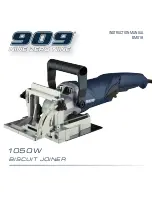
11
To cut the biscuit slot, the body
of the joiner is moved toward the
material. By utilising the various
features of the tool you can
create a wide range of different
types of joints.
Always make a reference line
to line up the machine with the
centre of the material to be
plunged to ensure accurate biscuit placement.
Operation – Making a cut
1. Adjust the height of the fence as required for
the application.
2. Adjust the bevel angle of the fence as required
for the application.
3. Mark the cutting line on the workpiece.
4. Line up the cutting guide located at the front of the fence
with the cutting line on the workpiece and place the
biscuit joiner against the workpiece.
5. Turn on the biscuit joiner using the on/off switch.
6. Whilst holding the rear handle push the biscuit joiner
forward so that the blade plunges into the workpiece.
7. Allow the return spring to retract the blade from the slot
and then switch off.
Making an edge to edge joint
Centreline Mark(s)
1. Position the 2 pieces together and draw a reference mark
at 90º to the centre point of each proposed joint location.
Space the joints about 4 inches apart.
2. Set the cutting depth to suit the biscuits you are using.
Generally, #20 biscuits suit most applications. If you are
using stock that is 19/32 inch thick or less, you will need
smaller biscuits.
3. Adjust the height of the fence as required.
4. Place the cutting guide at the centre point of each
slot in turn and press the fence against the edge
of the workpiece.
5. Switch on the biscuit joiner and plunge the blade forward
to make the cut.
6. Allow the return spring to retract the blade from the slot
and then switch off.
7. To cut a slot in the edge of the matching workpiece,
place this piece on a flat surface and place the biscuit
joiner against the edge.
8. Again line up the centre point of each slot and make
the cuts.
9. Once all the slots are cut insert a biscuit into each joint
and dry assemble the workpieces to ensure everything
lines up and fits.
10. Insert a water-based glue into the slots.
11. Place the biscuits in position and clamp the joint until
the biscuits swell and the glue sets.
Note:
It is possible that thick pieces of timber may
require two biscuits at each location, one at a height
of about 1/3rd the thickness of the wood, and the other
at about 2/3rd the thickness.
Direction of Plunge
Direction of Plunge
Centre line of
work and machine
Centre line of
work and machine
Crescent
shape cut
Crescent
shape cut
















